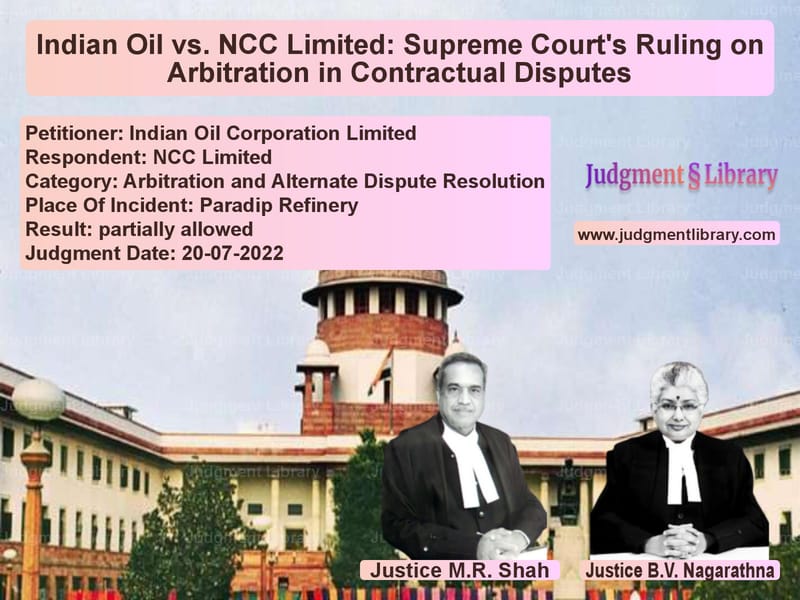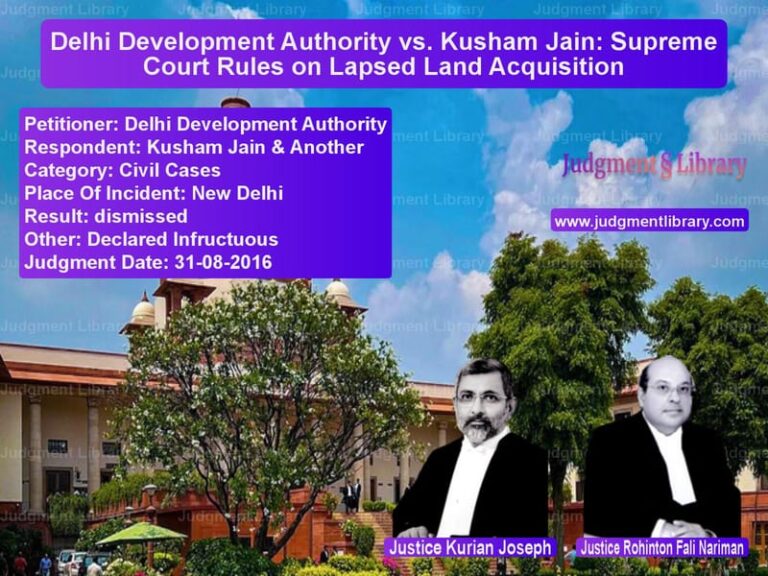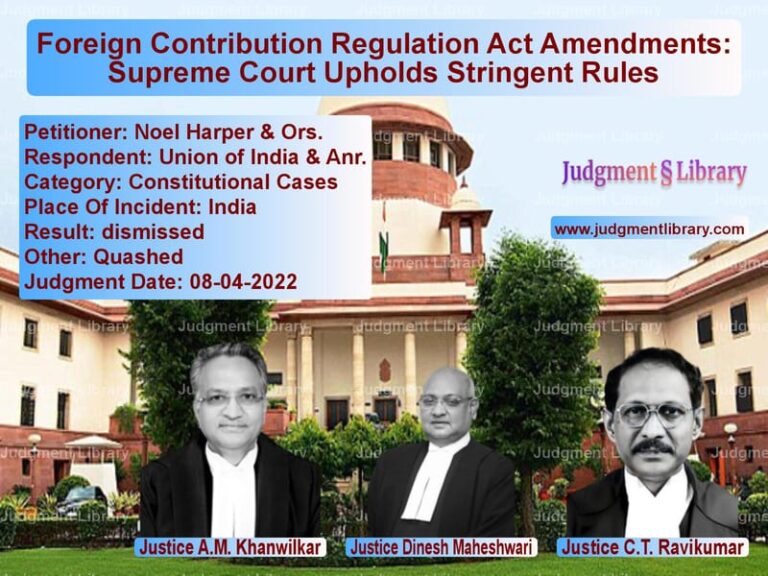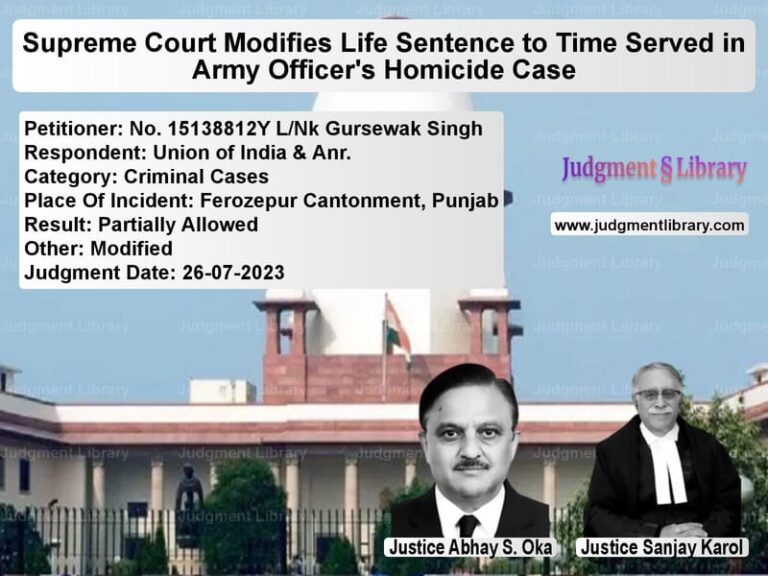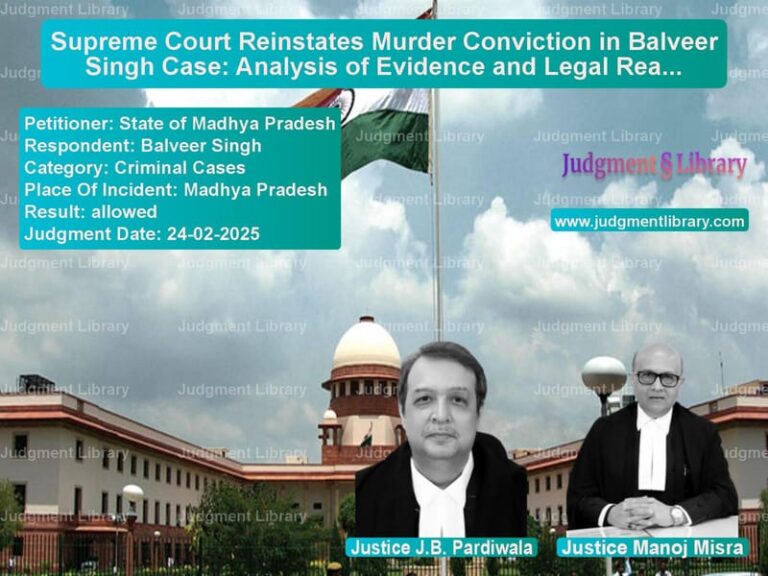Indian Oil vs. NCC Limited: Supreme Court’s Ruling on Arbitration in Contractual Disputes
The case of Indian Oil Corporation Limited vs. NCC Limited is a significant judgment in arbitration law concerning the interpretation of ‘Notified Claims’ and the scope of arbitration in contractual disputes. The Supreme Court examined whether certain claims raised by NCC Limited were arbitrable under the contract’s General Conditions and whether the rejection of claims by the General Manager of Indian Oil Corporation Limited (IOCL) was final. This ruling has broad implications for construction contracts, dispute resolution mechanisms, and the enforceability of arbitration clauses.
Background of the Case
IOCL and NCC Limited (NCCL) entered into an agreement for civil and structural works related to the Paradip Refinery project. The contract included an arbitration clause that stipulated that only ‘Notified Claims’ could be arbitrated. NCCL experienced project delays and submitted a final bill with additional claims. IOCL rejected these claims, arguing that they had already been settled.
NCCL moved the High Court under Section 11(6) of the Arbitration and Conciliation Act, 1996, seeking the appointment of an arbitrator. The High Court ruled in favor of NCCL, leading to an appeal by IOCL in the Supreme Court.
Read also: https://judgmentlibrary.com/arbitration-and-counterclaims-supreme-court-allows-nhais-counterclaim/
Arguments by the Petitioner (IOCL)
The Additional Solicitor General, representing IOCL, presented the following key arguments:
- Notified Claims Restriction: The contract explicitly stated that only ‘Notified Claims’ could be arbitrated. The General Manager’s rejection of the claims as non-notified was final.
- Full and Final Settlement: NCCL accepted payments as per the final bill, which constituted an ‘accord and satisfaction,’ making further arbitration unnecessary.
- Contractual Autonomy: Arbitration is a matter of contract, and the parties had agreed that only notified claims could be adjudicated by arbitration.
- Judicial Precedents: Several past Supreme Court rulings emphasized that courts should not intervene in matters where arbitration clauses explicitly limit arbitrability.
Arguments by the Respondent (NCC Limited)
NCCL, through its counsel, countered these arguments:
- Invalid Rejection of Claims: The General Manager’s rejection of the claims was unilateral, and the arbitration tribunal should determine whether the claims were valid.
- Coercion in Payment Acceptance: The acceptance of partial payments was not voluntary but done under economic duress, and claims were still outstanding.
- Natural Justice Principles: Restricting arbitration based on the unilateral decision of one party violated fundamental principles of natural justice.
- Role of High Court Under Section 11: The High Court correctly exercised its power by appointing an arbitrator to determine the dispute.
Supreme Court’s Observations
The Supreme Court, consisting of Justices M.R. Shah and B.V. Nagarathna, thoroughly examined the contract provisions and arbitration law principles. The Court observed:
- Notified Claims Doctrine: The contract specifically provided that only claims notified within the contractual period could be referred to arbitration.
- Authority of General Manager: The rejection of claims by the General Manager was binding as per the contract, making further arbitration impermissible.
- Party Autonomy in Arbitration: Arbitration is a matter of agreement between parties, and courts must respect limitations imposed within the contract.
- Role of High Court: The High Court had overstepped its jurisdiction by referring non-arbitrable claims to arbitration.
Judgment and Conclusion
The Supreme Court ruled in favor of IOCL, stating:
“The claims which have been rejected by the General Manager as not being Notified Claims cannot be referred to arbitration. The High Court has erred in appointing an arbitrator for such claims.”
However, the Court allowed arbitration for claims where there was a genuine dispute regarding their notified status, stating:
“In cases where the issue of whether a claim is notified or not is itself disputed, an arbitrator may determine this question.”
Key Takeaways
- Notified Claims Rule: Contracts restricting arbitration to ‘Notified Claims’ must be strictly followed.
- General Manager’s Authority: If a contract assigns final authority to a General Manager, courts will uphold this decision.
- Scope of Arbitration: Only disputes explicitly covered by an arbitration agreement can be referred to an arbitrator.
- High Court’s Jurisdiction: Courts cannot override contract provisions under the guise of appointing arbitrators.
Conclusion
The Supreme Court’s ruling in Indian Oil Corporation vs. NCC Limited reinforces the principle of contractual autonomy in arbitration agreements. It establishes that courts must respect restrictions imposed by contracts regarding which claims can be arbitrated. The decision ensures that businesses can rely on their contract terms and that arbitration is not used to circumvent agreed-upon dispute resolution mechanisms.
Petitioner Name: Indian Oil Corporation Limited.Respondent Name: NCC Limited.Judgment By: Justice M.R. Shah, Justice B.V. Nagarathna.Place Of Incident: Paradip Refinery.Judgment Date: 20-07-2022.
Don’t miss out on the full details! Download the complete judgment in PDF format below and gain valuable insights instantly!
Download Judgment: indian-oil-corporati-vs-ncc-limited-supreme-court-of-india-judgment-dated-20-07-2022.pdf
Directly Download Judgment: Directly download this Judgment
See all petitions in Arbitration Awards
See all petitions in Dispute Resolution Mechanisms
See all petitions in Enforcement of Awards
See all petitions in Settlement Agreements
See all petitions in Commercial Arbitration
See all petitions in Judgment by Mukeshkumar Rasikbhai Shah
See all petitions in Judgment by B.V. Nagarathna
See all petitions in partially allowed
See all petitions in supreme court of India judgments July 2022
See all petitions in 2022 judgments
See all posts in Arbitration and Alternate Dispute Resolution Category
See all allowed petitions in Arbitration and Alternate Dispute Resolution Category
See all Dismissed petitions in Arbitration and Alternate Dispute Resolution Category
See all partially allowed petitions in Arbitration and Alternate Dispute Resolution Category

